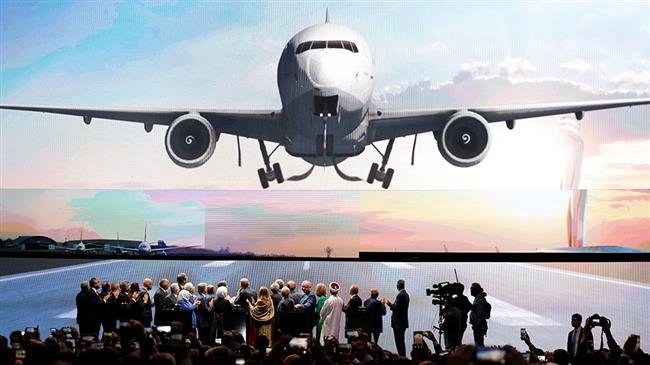Turkish President Recep Tayyip Erdogan on Monday inaugurated a massive new airport project in Istanbul, which he says will become the ‘world’s new hub’ once completed in 2028.
The opening of the airport’s first phase was celebrated in a lavish ceremony attended by over 50 foreign dignitaries from at least 18 countries, including Iran’s Foreign Minister Mohammad Javad Zarif, the representative of the Iranian government.
Among other officials present at the inauguration ceremony were Qatar's Emir Sheikh Tamim bin Hamad Al Thani, Sudanese President Omar al-Bashir and leaders from Pakistan, Kyrgyzstan, Kosovo, Macedonia, Moldova, Albania and Serbia.
Addressing the opening ceremony, Erdogan said the Istanbul International Airport would be a model to the world in terms of its architecture, construction, operation, and financing.
“Istanbul is a beautiful jewel between two seas … that's why we called [the airport] Istanbul,” he told the participants of the ceremony, which coincided with the 95th anniversary of the Turkish Republic.
He also noted that Ankara sees Istanbul Airport “as investment not only in our country but also in our region and the world.”

Erdogan said the new facility will continue to grow for the next decade until all phases are completed by 2028, according to state-run Anadolu Agency.
Once all its stages are completed, he said, Istanbul Airport will serve 150 million passengers annually.
“If needed, the annual capacity can be raised to 200 million,” he added.
“With the operation of Istanbul Airport, European air space will have to be restructured,” he said, adding that he expected it to be used for a large number of intercontinental flights.

It is expected that a daily 2,000 aircraft from more than 250 carriers will go through the airport by the end of 2018 to over 350 destinations, said Anadolu.
With the opening of the first phase, a total of 90 million passengers can use the airport on a yearly basis.
According to preliminary 2017 figures from the Airport Council International, Atlanta airport in the United States hosted almost 104 million passengers last year. Next came Beijing with 95.7 million passengers, Dubai with 88.2 million, Tokyo with 85.4 million and Los Angeles with 84.5 million.
The airport's maiden voyage will be from Istanbul to the Turkish capital, Ankara, on October 31.

Meanwhile, Istanbul's current main airport – named after Mustafa Kemal Ataturk – will remain in operation until the end of this year, Erdogan said, after which it will be closed to commercial flights and will transition to other uses, such as training activities, aviation fairs, and civil use.
Turkey’s flagship carrier Turkish Airlines says some flights to Ankara, Izmir and Antalya, as well as international flights to northern Cyprus and Azerbaijan, will be using the new airport for now. Its other routes will remain at Ataturk for the rest of this year.
The new airport represents a €10.3 billion ($11.6 billion) investment in all its phases, said Erdogan, adding that it will provide nearly €22.2 billion ($25.3 billion) in revenue to the government.
According to the Turkish president, “some €4.5 billion of the first phase was financed by three state-run lenders [Halkbank, Ziraat Bankasi, and Vakifbank], plus private lenders.”
The airport has been dogged by criticism over working conditions and safety standards. In February, the labor ministry said 27 workers had died since construction started in 2015, and last month police detained hundreds of protesting workers.
Read more:
Istanbul is a major hub for transit flights, attracting lucrative transfer traffic this year from major airports in the Persian Gulf as Turkey recovers from security worries, according to the travel data analysis company Forward Keys.
